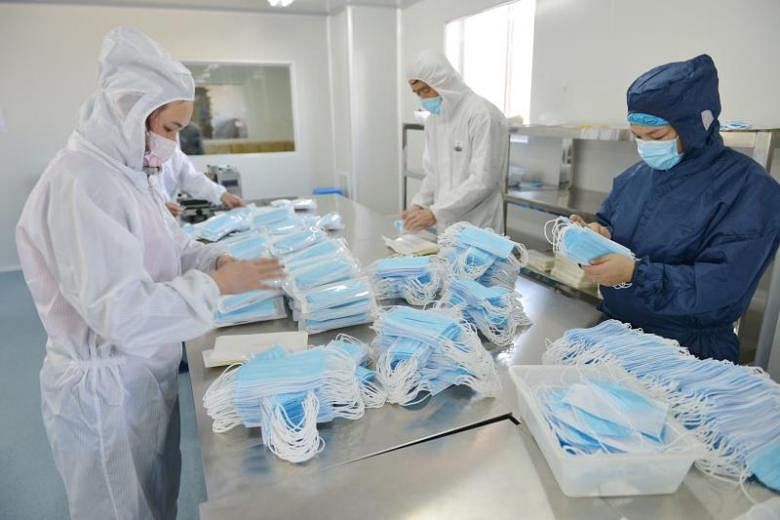BEIJING - Six hundred thousand masks recalled. Defective coronavirus test kits. Countries outright rejecting "Made in China" medical supplies.
These recent headlines have thrown a spanner in the works for China, as it attempts to use the Covid-19 pandemic to cast itself as a responsible nation, selling and gifting medical equipment to nations in dire need and fill the global leadership void left by the United States.
The donations have been widely covered in its state media, with images of smiling Chinese diplomats in countries, such as Myanmar, Serbia and even Italy, handing over boxes emblazoned with the Chinese flag and a phrase in the country's language celebrating friendship.
The equipment sold for profit received less publicity.
China is one of the world's largest producers of masks and medical equipment
In early February, deep in the throes of the coronavirus outbreak, it ramped up mask production, even converting factories that made things such as clothing and cars to producing masks.
By end-February, China was making 116 million masks a day.
It also stepped up production of testing kits, which had been quickly developed for the rapidly-escalating pandemic.
As the virus was brought under control, Beijing eased curbs on the export of medical equipment in March, resulting in protective equipment and test kits finding their way round the world.
But there have been issues with the supplies that are sold: the Dutch health ministry last week said it was recalling 600,000 face masks which did not fit and whose filters did not work despite a quality certificate.
Spanish health authorities said about 60,000 test kits it bought did not work, and Turkey complained some kits it purchased were inaccurate when testing patients.
While the Chinese embassy clarified that some of the kits in Spain were made by a company which did not have an official licence to sell its products, experts quoted by Chinese nationalist tabloid Global Times blamed Spanish medical staff for not using the kits properly.
China has said it is working to fix the problems and an opinion piece in the same newspaper this week acknowledged a need for greater supervision of its products.
Otherwise, it would dent mutual trust in global public health management, the newspaper added.
China took action.
Since April 1, exporters of medical equipment must show they have been certified in China and also meet the quality standards of the destination country, a commerce ministry statement said.
Also, exports are allowed only if they are approved by Chinese regulators.
Still, critics warn that China is using the pandemic to further its influence, with the European Union's chief diplomat Josep Borrell calling it the "politics of generosity".
"China is aggressively pushing the message that, unlike the US, it is a responsible and reliable partner," he wrote in a blog post last week.
"Armed with facts, we need to defend Europe against its detractors."
This led to Chinese telecommunications behemoth Huawei stopping donations to several countries, including Italy, Ireland, Poland and the Netherlands.
This, in a way, is indicative of China using its might to push countries into a "trade trap", selling equipment only to its friends, said Mr Drew Thompson, a visiting senior research fellow at the Lee Kuan Yew School of Public Policy.
"This is not soft power at work, it's coercion," he added.
Further, quality assurance and even counterfeiting have been a recurring Chinese problem, Mr Thompson noted, pointing to a raft of food safety scandals, including the addition of melamine in milk powder and vaccine scandals that "come up once every few years".
The issue boils down to conflict of interest because often, the local government in charge of regulating safety standards has a stake in the manufacturing companies.
"So it is in their interest to protect the producers, especially in a time like this when something you produce can make dollars but cost only pennies," he said.
In an editorial on Sunday, the Global Times noted that China is the main supplier of equipment to fight the pandemic, but the issue of quality has been sensationalised and politicised when foreign governments are unwilling to purchase from certain companies, fearing state links.
"We believe in the face of quality disputes, calmness is required and both sides shouldn't exaggerate the issues," said the editorial.
"Politicising this kind of dispute could jeopardise cooperation in the virus fight and should be avoided in any case." it added.












